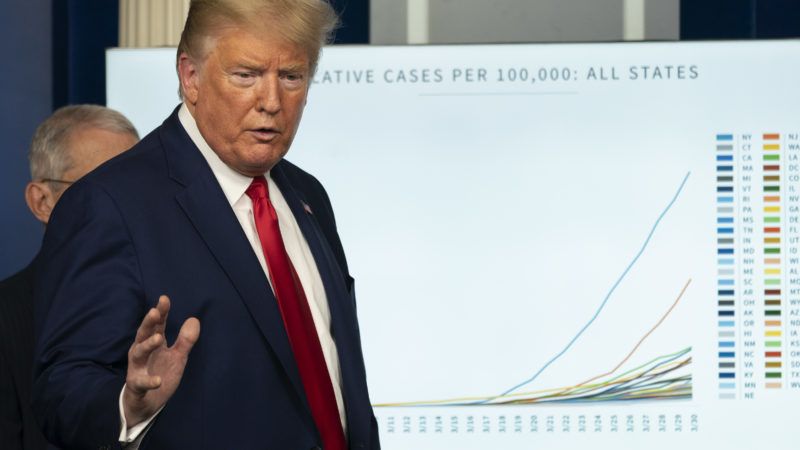No, Trump Does Not Have the Power to Declare a National Stay-at-Home Order
The president also cannot reopen the country whenever he pleases.

All eyes have been on President Donald Trump in recent weeks as he pontificates on the subject of social distancing amid COVID-19. Will he "open the country back up" for business, despite public health officials insisting that a nuanced, piecemeal approach is more prudent? Or, will he issue a national stay-at-home order, mandating that everyone severely restrict mobility for the foreseeable future?
As it turns out, he can do neither. You can thank federalism.
Trump's initial goal was to release Americans from self-isolation by Easter. That promise spurred an outcry from various experts, leading Trump to reverse course and extend social distancing guidelines through the end of April. Now some are reportedly encouraging the president to require that all of America shelter in place. That also won't happen.
"States are different," Trump said during a coronavirus briefing. "I understand that Florida issued one today. That's good. That's great. There are some states that don't have much of a problem. … You have to give a little bit of flexibility."
He's correct—states are different. And that's precisely why Americans can mostly disregard Trump's blanket proclamations.
The Constitution grants the federal government enumerated powers: it can print money, declare war, and regulate commerce, for instance. But as David French explains at The Dispatch, states maintain a great deal of sovereignty over themselves, so long as their rules don't run afoul of federal law and the state's own constitution.
"Going all the way back to 1824, the Supreme Court has noted that states have the power to impose 'quarantine laws' and 'health laws of every description,'" he writes. "In theory, Congress may use its power under the Constitution's Commerce Clause to grant the president additional authority over commerce during a public health crisis, but it has not done that. Thus, the true executive authority of state commerce rests with governors."
That's especially true when it comes to the proposal of a national lockdown, which Trump has no obvious legal avenues to impose.
What he does have, though, is political power.
The president could "send a much clearer signal that he wants all governors to do a lockdown on their states, to guide them about what that lockdown would require and what the standard should be," Lawrence Gostin, director of the O'Neill Institute for National and Global Health Law, told The Hill. That wouldn't be a legal act, Gostin said, but a political one.
As it so happens, all of the remaining stay-at-home-order-free states are Republican-led: Texas, Oklahoma, Utah, Wyoming, Missouri, Alabama, and South Carolina have some localized directives but nothing statewide; North Dakota, South Dakota, Nebraska, Iowa, and Arkansas have no such orders at all.
It might take some bully pulpit action from Trump to convince those governors to change course. Florida Governor Ron DeSantis (R) just issued his own stay-at-home directive on Wednesday after saying the day prior that he would do so if the president told him to. That national guidance never came, and DeSantis instead cited Trump's "demeanor the last couple of days" in deciding to move forward.
Whether or not all states should issue a stay-at-home order is a difficult question to answer. "[If] there should be a federally mandated directive for that or not, I guess that's more of a political question, but just scientifically, doesn't everybody have to be on the same page with this stuff?" Dr. Anthony Fauci, the country's top expert on infectious disease, said at a CNN town hall last night. States that don't encourage residents to self-isolate will be able to test the wisdom of that stance once the virus seeds within their borders and their hospital systems begin receiving COVID-19 patients.
If it seems like Trump should have the power to shut down the country by fiat, consider that such a sword could cut both ways: it would likewise mean he could reopen the entire country whenever he pleases. Earlier this week, Trump was still claiming that he had the power to force states back to normal—against a wealth of expert advice—in service of restarting the economy. Those who object to such a dangerous idea can thank federalism that Trump doesn't actually have that authority, even if it means having to deal with a few straggling states.


Show Comments (86)